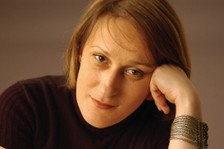
Isidora Žebeljan (1967, Serbia) acquired her BA and MA degrees in composition from the Faculty of Music in Belgrade (the class of Vlastimir Trajković). Since 2002, she has taught as a full professor at the Department of Composition at the Faculty of Music. She is a full member of the Serbian Academy of Sciences and Arts. Žebeljan is considered one of the most prominent composers in her generation. While she was still a student, her works were performed at every major festival in former Yugoslavia. During the 1990s, she mostly worked in film and incidental music, with the latter winning Serbia’s most prestigious awards several times. She has won three Sterija Awards and four YUSTAT Theatre Design Biennial awards for best incidental music. She was the 2005 fellow of the Civitella Ranieri foundation. In 2001, she won the Vasilije Mokranjac Award and in 2004 the Mokranjac Award for her opera Zora D.
Works by Žebeljan have been performed in Great Britain, Italy, France, Holland, Austria, Germany, Sweden, Finland, Spain, Ireland, Czech Republic, Estonia, Croatia, Serbia, and the US and at major music festivals such as the Venice Biennial, the festival in Bregenz, the ISCM festival in Sweden, RAI Festival Nuova Musica in Turin, Settembre musica and Festival L’Est in Milan, the West-German Radio Festival of Music, Galway arts Festival, Ultima Festival in Oslo, Festival Nous Sons in Barcelona, City of London Festival, Swaledale Festival, Walled City Music, Dulwich Music Festival in Great Britain, Crossing Border Festival in Holland, the Music Biennale in Zagreb, and BEMUS in Belgrade.
Her major works include: operas – Zora D; Maratonci (The Marathon); Simon, Izabranik (Simon the Foundling); Dve glave i devojka (Two Heads and a Girl); orchestral music – Konji Svetog Marka (The Horses of Saint Mark); Hum Away, Hum Away, Strings; Escenas picaras; Deserted Village; orchestral music with soloists – Rukoveti (Garlands), five songs for soprano and orchestra; Nove Ladine pesme (New Songs of Lada), for soprano and string orchestra (or string quartet); Igra drvenih štapova (Dance of the Wooden Sticks), for horn (or English horn) and string orchestra (or string quintet); chamber music – Pep It Up, fantasia for soprano and chamber ensemble; Pesme putnika u noći (Songs of a Traveller in the Night), for clarinet and string quartet; Polomka kvartet (Polomka Quartet), for string quartet; Simon and Anne, suite for violoncello (or English horn) and piano; vocal music – Latum lalo for mixed choir; Kada je Bog stvorio Dubrovnik (When God Created Dubrovnik), a song for mezzo-soprano and string quartet; piano music – Umbra, Il Circo.
Il Circo (1993), a piano sketch, a sonic experience of a mechanical piano accompanying a scene in a circus show. Although its broken melody is passionate, replete with abrupt decelerations and tense expectations, nostalgic and enchanting, its essence is paradoxically kept within the imposed mode of performance of the imaginary mechanical instrument, as though it were composed for a pianola. Almost like a hidden message to those who learned about nostalgia and the subtlety of feelings from two masters of Italian cinema, the piece bears an Italian title and contains a quotation from Nino Rota’s music from the final scene of F. Fellini’s 8½.


